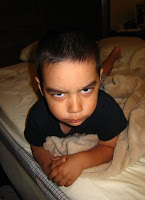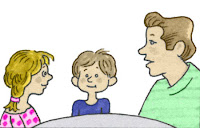Parenting Tips for Defiant 3-Year-Olds

As exasperating as her behavior is, your 3-year-old’s defiance is really about her asserting herself. While a 3-year-old defies her mom and dad because she's caught up in the excitement of her autonomy, a 3-year-old is likely to be reacting to something. When your youngster doesn't comply with a request you've made, what she's really saying is, "I don't like your rules." When this happens (and it will — often), don't be harsh, but do be assertive and consistent. This lets your 3-year-old know that you have established rules that she has to follow, and that mom and dad are in charge. Most 3-year-olds understand the concept of rules, so take time to explain to your youngster what they are and why they're important. Explain, too, what will happen if she breaks them. Be specific (e.g., "If you go into the street, you'll have to play inside for the rest of the day"). Also, enlist your child’s suggestions, because she'll be more a...
